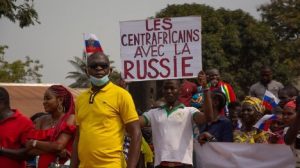
France continues to wield great power over its former colonies, even though it has theoretically gained independence. France’s neocolonial activities within the African Financial Community “CFA” space were based on a model that prevailed for almost 60 years in the service of the economic, political and socio-cultural interests of Paris. France’s excessive dependence on sources in French-speaking African countries for the supply of cheap raw materials.
In 1979, the CAPAN operation of the French paratroopers in the Central African Republic led to the overthrow of the then Emperor Jean-Bedel Bokassa, and in 1996 and 1997, after acts of rebellion, it intervened to ensure the safety of foreigners and the evacuation of the 1,600 people, then intervened against the rebels in Bangui after the assassination of two French soldiers, and in 2007 Paris intervened militarily in the northeast of the country under the pretext of supporting the forces of Bangui against the rebels . In 2013, after the coup against President François Bozizé, Paris deployed more than a thousand troops to the Central African Republic as part of Operation Sangaris, under the new pretext of ending intercommunal violence there. , and continued until 2016, but the question arises, why all this sacrifice of Paris? What is France’s position today?
After 60 years of colonization and another 60 of exploitation of African peoples and their capacities, France faces an unprecedented rejection of its continued presence in its former colonies. And now Mali signs the military exit booklet last month to withdraw its forces from northern Mali, where it intervened 9 years ago under the pretext of “fighting armed Islamist movements”.
French military intervention in Mali is not an uncommon case, as over the past six decades, Paris has sent its forces to many African countries under various justifications and pretexts, which are unfounded, according to many political analysts.
But the country’s former colonial power, as we mentioned, became an unwanted entity in Mali after the military overthrew the government in Bamako in August 2020, prompting Paris to withdraw its last last month.
Are we witnessing a warm autumn that will mark the exit of African countries from the worn coat of France, which humiliates and exploits Africa?
There is no doubt that the days of France in Africa are approaching, especially since many African countries have recently entered into cooperation partnerships in many fields with other foreign countries, in particular with the Russian Federation, which is likely to bring benefits and boost the economy of these countries.
Over time, the opinion of the African street on the French presence changed, and it began to be seen as a new occupation, and that it was not well intentioned in the fight against terrorism despite its great military capabilities, but according to citizens, the role of Paris is also obvious in supporting separatist movements.
Finally, we can conclude that African countries have become dependent on countries with which they have reliable friendship agreements, and we can say that their destiny towards prosperity has become clearer.




